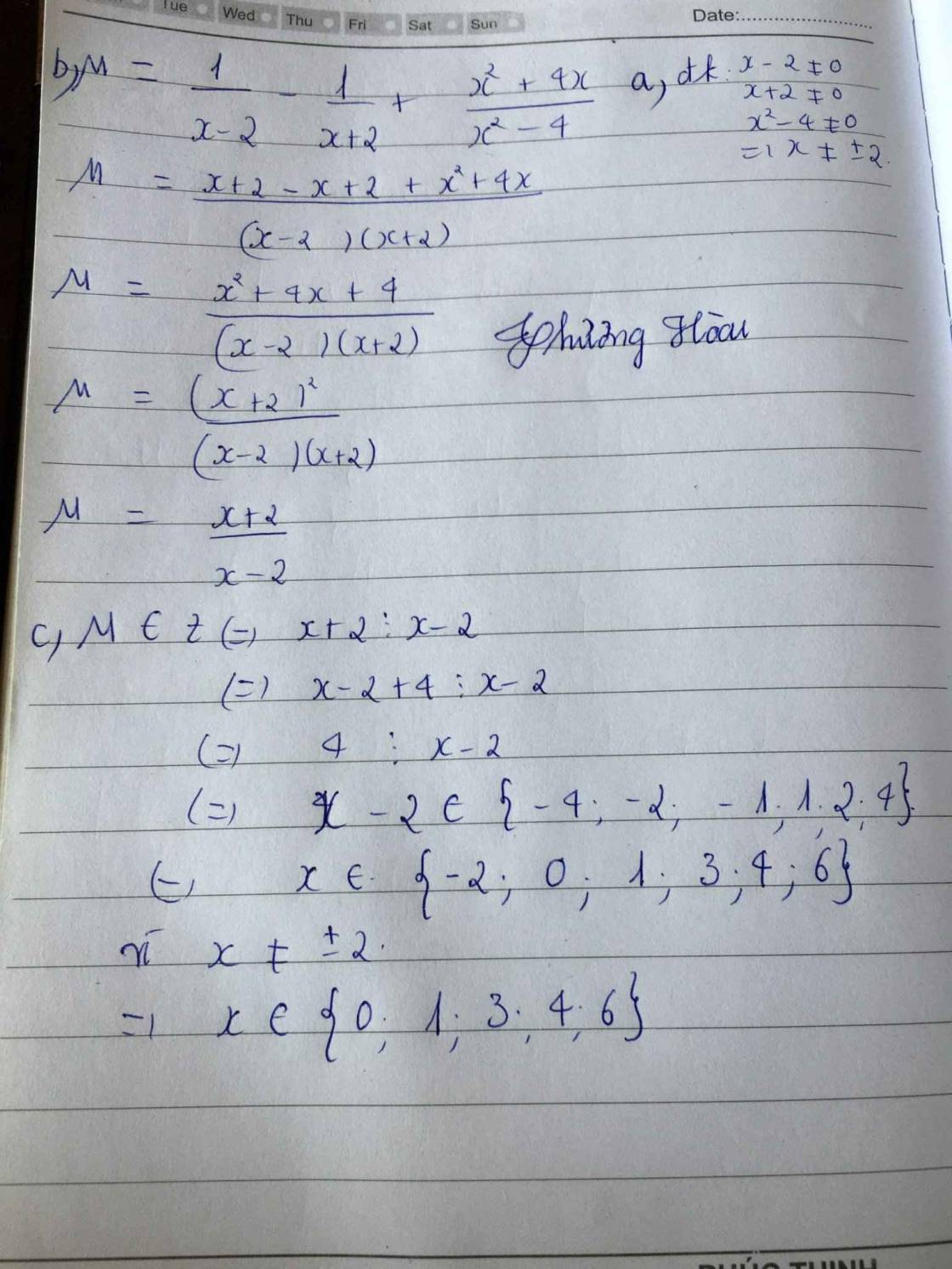tập hợp các giá trị của x để phân thức\(\dfrac{1}{4x^2-4x-15}\) không xác định là
Hãy nhập câu hỏi của bạn vào đây, nếu là tài khoản VIP, bạn sẽ được ưu tiên trả lời.


Đặt bthuc = A nhé
ĐKXĐ : \(2x\ne3y\)
\(A=\left[\dfrac{2x\left(4x^2+6xy+9y^2\right)}{\left(2x-3y\right)\left(4x^2+6xy+9y^2\right)}-\dfrac{27y^3+36xy^2}{\left(2x-3y\right)\left(4x^2+6xy+9y^2\right)}-\dfrac{24xy\left(2x-3y\right)}{\left(2x-3y\right)\left(4x^2+6xy+9y^2\right)}\right]\left[\dfrac{2x\left(2x-3y\right)}{\left(2x-3y\right)}+\dfrac{9y^2+12xy}{\left(2x-3y\right)}\right]\)\(=\left[\dfrac{8x^3+12x^2y+18xy^2-27y^3-36xy^2-48x^2y+72xy^2}{\left(2x-3y\right)\left(4x^2+6xy+9y^2\right)}\right]\left[\dfrac{4x^2-6xy+9y^2+12xy}{\left(2x-3y\right)}\right]\)
\(=\dfrac{8x^3-36x^2y+36xy^2-27y^3}{\left(2x-3y\right)\left(4x^2+6xy+9y^2\right)}\cdot\dfrac{4x^2+6xy+9y^2}{2x-3y}\)
\(=\dfrac{\left(2x-3y\right)^3}{\left(2x-3y\right)^2}=2x-3y\)
Với x = 1/3 ; y = -2 (tmđk) thay vào A ta được : A = 2.1/3 - 3.(-2) = 20/3

a)
\(ĐKXĐ:\left\{{}\begin{matrix}x-2\ne0\\x+2\ne0\\x^2-4\ne0\end{matrix}\right.< =>\left\{{}\begin{matrix}x\ne2\\x\ne-2\end{matrix}\right.\)
b)
\(\dfrac{1}{x-2}-\dfrac{1}{x+2}+\dfrac{x^2+4x}{x^2-4}\)
\(=\dfrac{1}{x-2}-\dfrac{1}{x+2}+\dfrac{x\left(x+4\right)}{\left(x-2\right)\left(x+2\right)}\)
\(=\dfrac{x+2}{\left(x-2\right)\left(x+2\right)}-\dfrac{x-2}{\left(x-2\right)\left(x+2\right)}+\dfrac{x\left(x+4\right)}{\left(x-2\right)\left(x+2\right)}\)
\(=\dfrac{x+2-x+2+x^2+4x}{\left(x-2\right)\left(x+2\right)}\)
\(=\dfrac{x^2+4x+4}{\left(x-2\right)\left(x+2\right)}\\ =\dfrac{\left(x+2\right)^2}{\left(x-2\right)\left(x+2\right)}\\ =\dfrac{x+2}{x-2}\)
c)
\(\dfrac{x+2}{x-2}=\dfrac{x-2+4}{x-2}=\dfrac{x-2}{x-2}+\dfrac{4}{x-2}=1+\dfrac{4}{x-2}\)
vậy M nhận giá trị nguyên thì 4⋮x-2
=> x-2 thuộc ước của 4
\(Ư\left(4\right)\in\left\{-1;1;-2;2;;4;-4\right\}\)
ta có bảng sau
| x-2 | -1 | 1 | -2 | 2 | 4 | -4 |
| x | 1(tm) | 3(tm) | 0(tm) | 4(tm) | 6(tm | -2(loại) |

Câu a :
Để biểu thức được xác định khi \(x+2\ne0\Leftrightarrow x\ne-2\)
Câu b :
\(\dfrac{x^2+4x+4}{x+2}=\dfrac{\left(x+2\right)^2}{x+2}=x+2\)
Câu c :
Để phân thức bằng 1 thì \(x+2=1\Leftrightarrow x=-1\)
Câu d :
Để biểu thức bằng 0 thì \(\left(x+2\right)^2=0\Leftrightarrow x=-2\) ( không thõa mãng )
Nên ko có giá trị x nào hết
a) ĐKXĐ : x+2≠0 ⇒x ≠ -2
b) \(\dfrac{x^{2^{ }}+4x+4}{x+2}\)= \(\dfrac{\left(x+2\right)^2}{x+2}\)= x+2
c) x+2= 1
⇒ x = -1
d) có x = -2 thì giá trị của phân thức = 0

a) ĐKXĐ: \(x\notin\left\{1;-1\right\}\)
b) Ta có: \(\dfrac{4x-4}{2x^2-2}\)
\(=\dfrac{4\left(x-1\right)}{2\left(x-1\right)\left(x+1\right)}\)
\(=\dfrac{2}{x+1}\)
Để phân thức có giá trị bằng -2 thì \(\dfrac{2}{x+1}=-2\)
\(\Leftrightarrow x+1=-1\)
hay x=-2(thỏa ĐK)

a) ĐKXĐ:
\(\left\{{}\begin{matrix}x^2-9\ne0\\x+3\ne0\end{matrix}\right.\)
\(\Leftrightarrow\left\{{}\begin{matrix}x\ne\pm3\\x\ne-3\end{matrix}\right.\Leftrightarrow x\ne\pm3\)
b) \(A=\dfrac{x+15}{x^2-9}-\dfrac{2}{x+3}\)
\(A=\dfrac{x+15}{\left(x+3\right)\left(x-3\right)}-\dfrac{2\left(x-3\right)}{\left(x+3\right)\left(x-3\right)}\)
\(A=\dfrac{x+15-2x+6}{\left(x+3\right)\left(x-3\right)}\)
\(A=\dfrac{21-x}{\left(x+3\right)\left(x-3\right)}\)
c) Thay x = - 1 vào A ta có:
\(A=\dfrac{21-\left(-1\right)}{\left(-1+3\right)\left(-1-3\right)}=\dfrac{21+1}{2\cdot-4}=\dfrac{22}{-8}=-\dfrac{11}{4}\)

a) khi hay
khi và
hay và
khi hay
Do đó điều kiện để giá trị của biểu thức được xác định là
b) Để chứng minh biểu thức không phục thuộc vào biến x ta phải chứng tỏ rằng có thể biến đổi biểu thức này thành một hằng số.
Thật vậy:
a, \(2x-2\ne0\) khi \(2x\ne2\Leftrightarrow x\ne1\)
\(x^2-1=\left(x+1\right)\left(x-1\right)\ne0\) khi \(x+1\ne0\) và \(x-1\Leftrightarrow x\ne-1\) và \(x\ne1\)
\(2x+2=2\left(x+1\right)\ne0\) khi \(x\ne-1\)
điều kiên của x để giá trị của biểu thức được xác định là : \(x\ne-1\) và \(x\ne1\)
b, \(\left(\dfrac{x+1}{2x-2}\dfrac{3}{x^2-1}-\dfrac{x+3}{2x+2}\right).\dfrac{4x^2-4}{5}\)
= \(\left[\dfrac{x+1}{2\left(x-1\right)}+\dfrac{3}{\left(x+1\right)\left(x-1\right)}+\dfrac{-\left(x+3\right)}{2\left(x+1\right)}\right].\dfrac{4\left(x^2-1\right)}{5}\)
=\(\dfrac{\left(x+1\right)\left(x+1\right)+3.2-\left(x+3\right)\left(x-1\right)}{2\left(x+1\right)\left(x-1\right)}.\dfrac{4\left(x+1\right)\left(x-1\right)}{5}\)
= \(\dfrac{x^2+2x+1+6-x^2+x-3x+3}{2\left(x+1\right)\left(x-1\right)}.\dfrac{4\left(x+1\right)\left(x-1\right)}{5}\)
= \(\dfrac{10}{2\left(x+1\right)\left(x-1\right)}.\dfrac{4\left(x+1\right)\left(x-1\right)}{5}\)
= \(\dfrac{40\left(x+1\right)\left(x-1\right)}{10\left(x+1\right)\left(x-1\right)}\)
Vậy giá trị biểu thức được xác định thì nó không phụ thuộc vào giá trị của biến X

Đặt phân thức trên là A.
Để phân thức A không xác định \(\Leftrightarrow4x^2-4x-15=0\)
\(\Leftrightarrow4\cdot\left(x-\dfrac{5}{2}\right)\cdot\left(x+\dfrac{3}{2}\right)=0\)
\(\Rightarrow\left[{}\begin{matrix}x-\dfrac{5}{2}=0\\x+\dfrac{3}{2}=0\end{matrix}\right.\Leftrightarrow\left[{}\begin{matrix}x=\dfrac{5}{2}\\x=-\dfrac{3}{2}\end{matrix}\right.\)
Vậy \(x=\left\{-\dfrac{3}{2};\dfrac{5}{2}\right\}\) thì phân thức A không xác định.
Phân thức \(\dfrac{1}{4x^2-4x-15}\) không xác định khi \(4x^2-4x-15=0\)
Ta có: \(4x^2-4x-15=0\)
\(\Leftrightarrow x^2-x-\dfrac{15}{4}=0\)
\(\Leftrightarrow x^2-2.x.\dfrac{1}{2}+\dfrac{1}{4}-4=0\)
\(\Leftrightarrow\left(x-\dfrac{1}{2}\right)^2-4=0\)
\(\Leftrightarrow\left(x-\dfrac{1}{2}\right)^2=4\)
\(\Leftrightarrow\left[{}\begin{matrix}x-\dfrac{1}{2}=2\\x-\dfrac{1}{2}=-2\end{matrix}\right.\Leftrightarrow\left[{}\begin{matrix}x=\dfrac{5}{2}\\x=\dfrac{-3}{2}\end{matrix}\right.\)
Vậy \(x=\dfrac{5}{2}\) hoặc \(x=\dfrac{-3}{2}\)